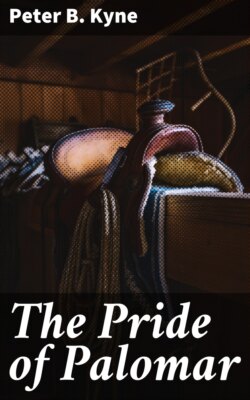Читать книгу The Pride of Palomar - Peter B. Kyne - Страница 13
На сайте Литреса книга снята с продажи.
VII
ОглавлениеTable of Contents
At seven o'clock, dinner being over, Kay excused herself to the family and Mr. Okada, passed out through the patio gate, and sought a bench which she had noticed under a catalpa tree outside the wall. From this seat, she, like Pablo, could observe anybody coming up the palm-lined avenue. A young moon was rising over the hills, and by its light Kay knew she could detect Don Mike while he was yet some distance from the house.
At seven-thirty, he had not appeared, and she grew impatient and strolled round to the other side of the hacienda. Before Pablo's casa, she saw the red end of a cigarette; so she knew that Pablo also watched.
"I must see him first," she decided. "Pablo's heart is right toward Don Mike, but resentful toward us. I do not want him to pass that resentment on to his master."
She turned back round the hacienda again, crossed down over the lip of the mesa at right angles to the avenue, and picked her way through the oaks. When she was satisfied that Pablo could not see her, she made her way back to the avenue, emerging at the point where it connected with the wagon-road down the valley. Just off the avenue, a live-oak had fallen, and Kay sat down on the trunk of it to watch and wait.
Presently she saw him coming, and her heart fluttered in fear at the meeting. She, who had for months marked the brisk tread of military men, sensed now the drag, the slow cadence of his approach; wherefore she realized that he knew! In the knowledge that she would not have to break the news to him, a sense of comfort stole over her.
As he came closer, she saw that he walked with his chin on his breast; when he reached the gate at the end of the avenue, he did not see it and bumped into it. "Dios mio!" she heard him mutter. "Dios! Dios! Dios!" The last word ended in tragic crescendo; he leaned on the gate, and there, in the white silence, the last of the Farrels stood gazing up the avenue as if he feared to enter.
Kay sat on the oak trunk, staring at him, fascinated by the tragic tableau.
Suddenly, from the hacienda, a hound gave tongue—a long, bell-like baying, with a timbre in it that never creeps into a hound's voice until he has struck a warm scent. Another hound took up the cry—and still another. Don Mike started.
"That's Nip!" Kay heard him murmur, as the first hound sounded. "Now, Mollie! Come now, Nailer! Where's Hunter? Hunter's dead! You've scented me!"
Across the mesa, the pack came bellowing, scattering the wet leaves among the oaks as they took the short cut to the returning master. Into the avenue they swept; the leader leaped for the top of the gate, poised there an instant, and fell over into Don Mike's arms. The others followed, overwhelming him. They licked his hands; they soiled him with their reaching paws, the while their cries of welcome testified to their delight. Presently, one grew jealous of the other in the mad scramble for his caressing hand, and Nip bit Mollie, who retaliated by biting Nailer, who promptly bit Nip, thus completing the vicious circle. In an instant, they were battling each other.
"Stop it!" Don Mike commanded. "Break!"
They "broke" at his command, and, forgetting their animosities, began running in circles, in a hopeless effort to express their happiness. Suddenly, as if by common impulse, they appeared to remember a neglected duty, and fled noisily whence they had come.
"Ah, only my dogs to welcome me!" Kay heard Don Mike murmur. And then the stubborn tears came and blinded him, so he did not see her white figure step out into the avenue and come swiftly toward him. The first he knew of her presence was when her hand touched his glistening black head bent on his arms over the top rail of the gate.
"No, no, Don Mike," he heard a sweet voice protesting; "somebody else cares, too. We wouldn't be human if we didn't. Please—please try not to feel so badly about it."
He raised his haggard face.
"Ah, yes—you!" he cried. "You—you've been waiting here—for me?"
"Yes. I wanted to tell you—to explain before you got to the house. We didn't know, you see—and the notice was so terribly short; but we'll go in the morning. I've saved dinner for you, Don Mike—and your old room is ready for you. Oh, you don't know how sorry I am for you, you poor man!"
He hid his face again.
"Don't—please!" he cried, in a choked voice. "I can't stand sympathy—to-night—from you!"
She laid a hand on his shoulder.
"Come, come; you must buck up, old soldier," she assured him. "You'll have to meet Pablo and Carolina very soon."
"I'm so alone and desperate," he muttered, through clenched teeth. "You can't—realize what this means—to me. My father was an old man—he had—accomplished his years—and I weep for him, because I loved—him. But oh, my home—this—dear land——"
He choked, and, in that moment, she forgot that this man was a stranger to her. She only knew that he had been stricken, that he was helpless, that he lacked the greatest boon of the desolate—a breast upon which he might weep. Gently she lifted the black head and drew it down on her shoulder; her arm went round his neck and patted his cheek, and his full heart was emptied.
There was so much of the little boy about him!
